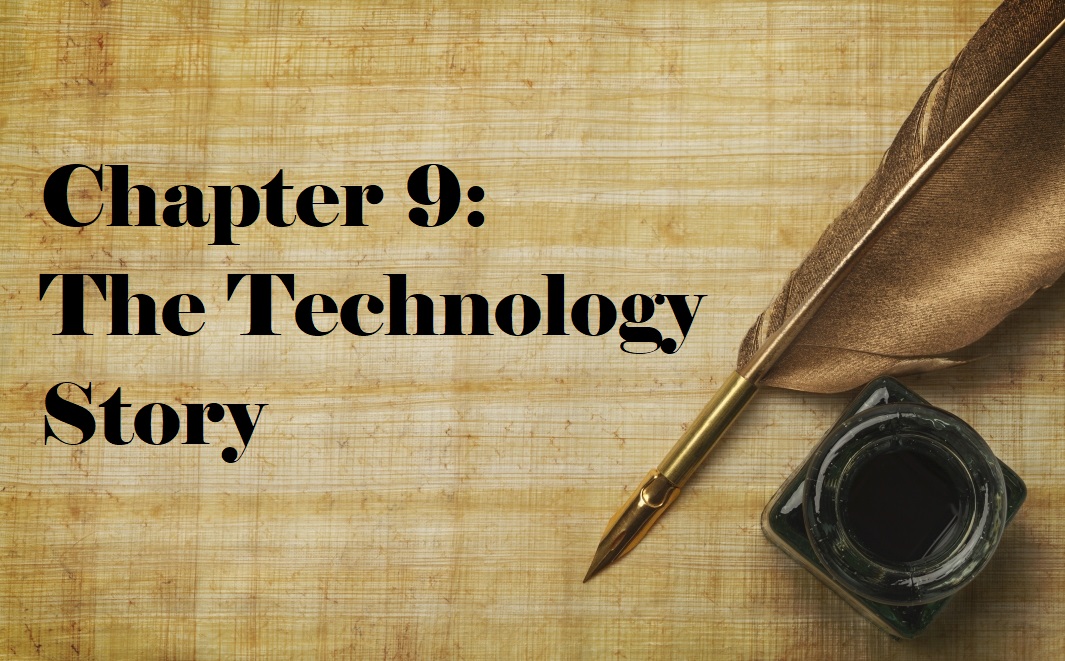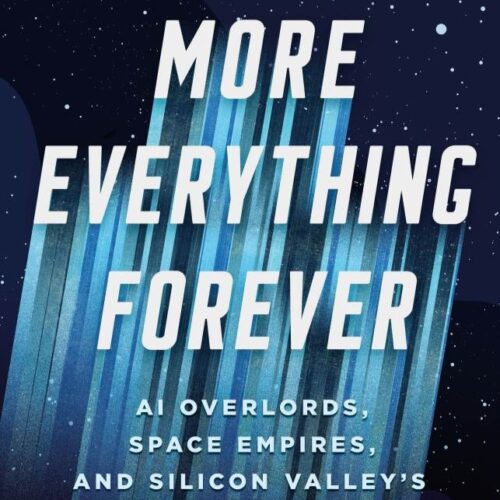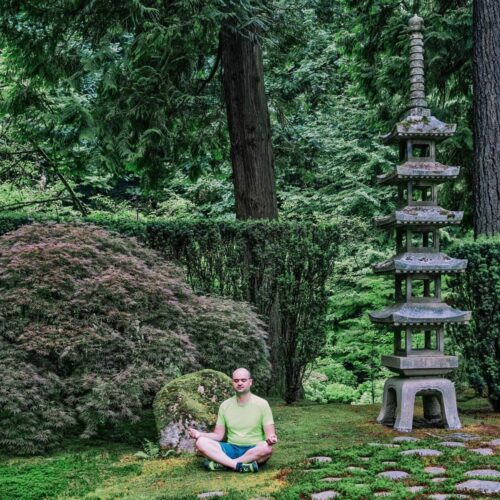Chapter 9: The Technology Story
Socrates / Podcasts, ReWriting the Human Story
Posted on: June 28, 2021 / Last Modified: June 28, 2021
Podcast: Play in new window | Download | Embed
Subscribe: RSS
 ReWriting the Human Story: How Our Story Determines Our Future
ReWriting the Human Story: How Our Story Determines Our Future
an alternative thought experiment by Nikola Danaylov
Chapter 9: The Technology Story
Technology improves the lives of people who can avoid being dominated by it and forced into debilitating addictions to it. Frank Kaufmann
The 1st atomic bomb was nicknamed “gadget.” Does this fact say something about who we are? Or does it say something about the nature of technology and the power to do good or evil?
I will begin this chapter by looking at the most popular myths about technology. I will then look at the etymological origins as well as several definitions of the term. Finally, I will conclude by arguing that story is the core technology of our civilization.
Perhaps the most popular and maybe even the most dangerous myth about technology is the myth that technology allows us to see the future.
“Come and see this amazing new technology,” we often hear, “And you will see the future.”
I call this “the Crystal Ball” myth because I grew up with the witches and wizards’ fairy tales where magic crystal balls gave them the ability to see the future.
Of course, Arthur C. Clarke’s famous 3rd law states that “Any sufficiently advanced technology is indistinguishable from magic.” And so perhaps we shouldn’t be surprised that modern technology has become synonymous with the crystal ball from our old fairy tales. But the Crystal Ball perception of technology is not only a myth. It is also dangerous.
To evaluate the crystal ball metaphor, we have to first understand the etymology of the word technology – what it means and stands for, or at least what it used to mean and stand for. Then we can judge whether the etymological meaning of the word supports the above metaphor or some alternatives that I will propose.
The word technology comes from two Greek words – techne and logos. Techne means art, skill, craft, or the way, manner, or means by which a thing is gained. Logos means word, the utterance by which inward thought is expressed, a saying, or an expression. So, technology means words or discourse or a conversation about the way things are gained. In other words, technology is merely “how” we do things and not “what” we want or “why” we do them. Because it is not an end-in-itself. Instead, technology is merely a means-to-an-end, a tool.
That is why I want to propose a better metaphor: technology is a magnifying mirror. It doesn’t show us the future but merely reflects the present and, more importantly, it reflects who we are.
Technology is a mirror because it reflects the engineers, designers, entrepreneurs, and users who create and use it. But it is also a mirror to humanity in general and our collective dreams, hopes and fears, our knowledge and our ignorance, our privileges and our responsibilities, our strengths, and our weaknesses, our good, and our evil. But it is not a usual kind of mirror because technology magnifies and amplifies things, and hence it brings its own biases. Thus it always has unforeseen consequences. And the critical point here is that technology reflects our essence. So, in a way, the story of technology is the story of humanity. [Just like the story of humanity is often told as the story of technology – e.g., the claim that we are a “tool-maker.”]
Now, why do I claim that the crystal ball metaphor is dangerous?
The result of believing it is that most tech conversations are techno-deterministic and focus exclusively on fixing the technology while ignoring the fact that it isn’t produced in a vacuum. It mirrors our political, social, evolutionary and cognitive biases. In other words, to use my metaphor, focusing exclusively on fixing the technology is like looking into a mirror, not liking the image we see, and then trying to fix that by polishing the mirror. But we have it upside down. Instead of focusing on the technology, we might want to invest some time and resources, perhaps most of them, on improving ourselves instead – i.e., who we are being, what we are doing, and why we are doing it in the first place.
In fact, I will go as far as claiming that one of the keys to our future is keeping the right balance between exponential technology and humanity. So humanity must be exponential too. Not in the narrow technical sense. But in a broader philosophical sense with respect to wisdom, ethics, compassion, and strength of character in the face of ever-growing technological power and temptations.
Therefore, what I’m proposing is that, at the end of the day, it is not about technology. It is about us and what we do.
Because we can have the best possible how, but if we mess up our why or what, we will end up doing more damage than good. That is why technology is not enough. It is necessary, but it is not sufficient.
And there are many historical examples of how better technology did not make our lives better but worse. For instance, historian Yuval Harari called the Agrarian Revolution “history’s greatest fraud.” [Because in every way measurable – i.e., health, longevity, work hours per week, nutrition, infant mortality, etc., we were better off as hunter-gatherers. The Renaissance and the Industrial Revolution were also “frauds” in the sense that most contemporaries ended up worse off than they previously were. So, the story of progress, that technology is inherently good or that it always gives us freedom is incomplete and one-sided. And, if we are not careful, we are running the risk that our current technological revolution may turn out to be our epoch’s greatest fraud.
Because technology is pretty good at giving us what we want, but it is terrible at giving us what we need. It is good at supplying information, even knowledge, but terrible at providing wisdom. It helps us live easier, more comfortable, and longer lives, but it does not tell us why we should live or what to do with our lives in the first place. Most importantly, technology does not make us happy. There is no app for happiness. In fact, during the COVID19 pandemic, we are using more tech than ever before, and we are more unhappy, more depressed, and more suicidal than ever before.
So, while technology may help us get whatever we wish, it is wisdom that helps us figure out what we should want [or not] in the first place. Intelligence can be useful only in that case. Because lacking the wisdom to know what we should and should not want but having artificial or biological intelligence to get it is a path to self-destruction.
That is why all the significant existential challenges we face today – be it Climate Change, Environmental Destruction, Nuclear weapons, Soil Erosion, Species Extinction, Plastic, and Other Toxic Pollution, Ocean Acidification, even Pandemics, etc. are without exception the same problem playing itself out over and over again. Namely, humanity’s technological power is out-pacing our wisdom to control and use it in a productive, safe, non-destructive, and non-suicidal manner. Clearly, more powerful technology, not accompanied by a proportional growth in our own wisdom to utilize it, will make the gap bigger and therefore the above problems worse, not better.
And that is why we must go back to the original meaning of the word technology. Technology is merely a tool, a means to an end, never an end in itself. It is useful as a crutch, but, as with all crutches, we can become slaves to its use unless we condition and develop our own strength. It can, therefore, enable just as much as it can disable us. It can destroy and enslave us just as much as it can liberate and save us. Therefore, while technology may be the path to our salvation or the path to our destruction, it will not be the reason as per why we end up there.
In short, technology doesn’t help us see the future. It only allows us to see ourselves. And if we put garbage in, we are going to get garbage out. Only this time it’s exponential. Ditto with stupidity, prejudice, or evil. Therefore, we can’t fix technology unless we take both personal responsibility – as individuals, and collective responsibility – as corporations, organizations, nations, and even as a species. Because technology is a magnifying mirror, not a crystal ball.
The classic definition of technology is very important but there are further subtleties in the ancient Greek term as well as additional benefits in considering some contemporary definitions. For example, Kevin Kelly defines technology as “anything useful invented by a mind.” For Angus Fletcher “technology is any human-made thing that helps to solve a problem.” I want to bring these to your attention to stress the fact that technology does not have to necessarily be material in nature. Of course, if you are a software engineer you already know that. But we need to expand this awareness and recognize its implications.
If we combine Kelly and Fletcher’s definitions, technology is “anything useful invented by the human mind that helps us solve a problem.”
There are 2 types of problems and therefore 2 types of technology that we use: outward and inward. Outward technology is what we usually refer to when we evoke the term. It is the technology that helps us solve the problem of being human in a non-human world – e.g. survival – by solving problems such as thirst, hunger, cold, heat, safety, and security, etc. But inward technology is equally important for it helps us solve the problem of simply being human.
“The problem of being human?!” you may ask.
“Well, yes, indeed.”
We face the problem of being human when asking: “Who am I? What is the purpose of life? Why am I here? What is human? What is the answer to life, the universe, and everything?”
All big questions with no obvious, if any answer at all. At the same time, we’re being pushed and pulled by our physical and intellectual nature, our passions of love and hate, our fear of death and rage against the dying of the light, our desire to have fun, help others, and make a difference. In short, being human is a problem in its own right. A problem each of us has to solve on our own. And the primary technology we use to solve that problem is called story. Because story is something useful invented by the human mind that helps us solve problems. And only story can supply answers to the above fundamental questions. That’s why Jeff DeChambeau defined story as “information processing technology.” And that’s is also why Robert McKee noted that “Story is about trying to make sense out of the confusion, chaos, and terror of being a human being.”
In conclusion, the most popular and powerful technology is not the wheel. It is not the internet. It is not even money, though money, as Yuval Harari has pointed out, is the most popular story because almost everyone believes in money. But, most popular or not, money is just another story – it doesn’t exist outside of our imagination for we can’t eat, drink or wear money itself. [Bitcoin doesn’t even have a physical representation but is entirely computer code.] So if money is a particular story and story is technology then story is, in fact, the most successful, most effective, and most popular technology. That is why you can have a civilization without the wheel. Even without money. For those are just 2 particular stories. But you can’t have one without story. Because story brings us together. No story, no civilization. As Jonathan Gottschall noted:
Story — sacred and profane — is perhaps the main cohering force in human life. A society is composed of fractious people with different personalities, goals, and agendas. What connects us beyond our kinship ties? Story. As John Gardner puts it, fiction “is essentially serious and beneficial, a game played against chaos and death, against entropy.” Story is the counterforce to social disorder, the tendency of things to fall apart. Story is the center without which the rest cannot hold.








